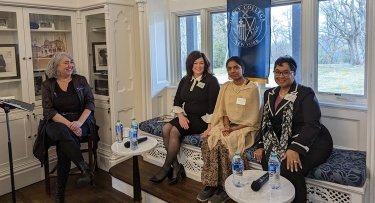Mercy College Women’s History Month Event Celebrates Women Trailblazers in Technology

Seated from left to right, Mercy College Provost and Vice President of Academic Affairs Eva Fernández, Chief Information Officer Camille Shelley, Kanchana Iyer ’24, Mercy College student and computer science major and Valerie Mason Cunningham, H.D. ’20, Mercy College Trustee.
Mercy College President Tim Hall hosted a Women’s History Month community reception in celebration of women trailblazers in technology who have paved the way for future generations of leaders. The event took place on March 22 and gathered Mercy students, alumni, faculty, staff and community leaders at the Moller House at Mercy College’s Tarrytown office location.
The panel discussion, moderated by Mercy College Provost and Vice President of Academic Affairs Eva Fernández, included panelists Valerie Mason Cunningham, H.D. ’20, Mercy College Trustee and retired vice president of channel marketing for North America operations, Xerox Corporation; Camille Shelley, chief information officer, Mercy College; and Kanchana Iyer ’24, Mercy College student and computer science major.
Iyer is part of a pilot program at Mercy supported by Google that aims to encourage diversity, equity and inclusion in the technology industry. After a rigorous application process, 13 Mercy students began the program, known as TechWise, in March 2022 with the rest of the pilot cohort, which includes a total of 120 students from Mercy and four other institutions in Pennsylvania, Iowa, South Carolina and Nevada. TechWise is a program offered by global ed-tech company TalentSprint and supported by Google that prepares students from underrepresented groups for high-growth careers in technology.
Westchester County Legislator George Latimer provided remarks. “I think it’s important, as Mercy is doing, to recognize this important field (technology). This is the field of the future for all of us.”
Hall noted, “From my perspective, the Sisters of Mercy are looking wiser and wiser, and more and more full of forethought when they established this college. They started out serving daughters of working-class families and over the years the College has continued to serve those students who have not always been served as they should have; students who are frequently underestimated to make sure they get a chance to be exactly who they are capable of being.”
“There are few fields where women are more underrepresented than tech. We (higher education) need to empower women to have access to it,” said Fernández.
Mercy College is paving a diverse woman in tech pipeline for future generations. Women are well represented in science, technology, engineering and math (STEM) programs at Mercy: 66% of undergraduates in STEM are women. The number of women in STEM has grown by 11.6% over the last seven years. The Mercy College Center for STEM Education creates opportunities for school-aged children in historically marginalized communities by providing hands-on STEM enrichment activities for learning, career readiness, enjoyment and personal and community growth. Through The STEM Ready Grant, awarded to Mercy in 2021, by the U.S. Department of Education under the agency’s Title III Hispanic Serving Institutions (HSI) STEM and Articulation Program, the College is developing and carrying out activities to increase the number of Hispanic and low-income students attaining degrees in STEM.
The panelists discussed strategies for advancing women in tech and creating a culture where women thrive.
Mason Cunningham noted, “It is important to recognize that you are not alone and reach out. Having allyship and opportunities will help you grow into what you want to be. Joining associations or clubs in school, getting opportunities to expand your horizons, building your networks of professors will give you the supportive environment you need. At Xerox, we had these employee relations groups, that became communities in which you knew you could be vulnerable. When you have those communities you can engage with, you can shift and really believe you can keep going.”
They also discussed how we can attract more women and other groups underrepresented in tech into the field.
“I think it’s important too to raise awareness that technology is not just a single thing, not just a program. There are so many different avenues. There’s health care technology and financial technology, for example. I would say that higher ed can build a comprehensive suite of skills, in addition to technology skills and communication skills beyond programming and network systems so that we can support our students,” said Shelley.
Iyer added that institutions should try to create more opportunities to expand students’ knowledge like tech programs and partnerships like the one with Google. “What helped me was the Techwise program. It has been rigorous but really helped me with my confidence and has allowed me to build my skillset and point me in the right direction,” said Iyer.
When asked what advice they would give their younger selves, Iyer concluded by saying, “Be optimistic and know that you’re the main character of your story and no one can take that away, so just keep going.” Shelley and Mason Cunningham agreed and added that one should never underestimate one’s value and ability to persevere.
To watch the Mercy College Women's History Month panel discussion, please click here.
